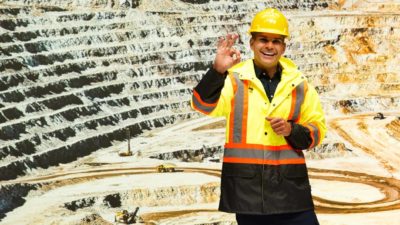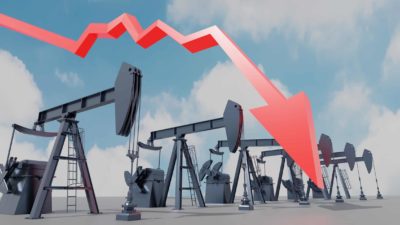As coronavirus shutdowns ease, the S&P/ASX 100 Index (XTO) is trading in a range between about 4,300 and 4,540 points. Investors think we're at the start of the recovery, but there are still many risks ahead.
Social distancing will be in place for a while. This is going to have an impact on hospitality, discretionary retail, shopping centres and entertainment stocks. The issue is whether coronavirus impacts are fully priced into the bourse. Few companies have given guidance so far, so questions remain about whether share prices really reflect how results will play out this earnings season.
The relative strength index (RSI) indicates the ASX 100 swung from overbought to over-sold during February. It then reverted to the mean, where it's been since early April, suggesting fair value is around 4,500 points. But analysts are much more bearish. In a note to clients, Elliot Management's Paul Singer speculated the value of the ASX 100 could still halve, which indicates the bottom may actually be around 2,967 points.
Longer term, Australia is in a good place relative to many countries, in terms of the way we're weathering the COVID-19 crisis. There may be an opportunity for Australia to assume a leadership position in the new global order by hunkering down and re-starting tech-led manufacturing.
Looking towards earnings season
Some analysts say the market has become much more rational after panic selling in the first month of the crisis. Even though volatility has reduced, there are still clear winners and losers in the current climate.
Financials, resources and health care make up almost 60% of the S&P/ASX 200 Index (ASX: XJO) and the market's direction is largely determined by the vagaries of these sectors. The issue is whether the value of stocks in these industries already account for risks, such as low interest rates and bad debts (notwithstanding the pandemic is largely good news for health stocks). Resources businesses have long-term contracts in place. So any disruption to Australia's relationship with China, which relies on our iron ore in particular, won't affect miners in the immediate term.
Alex Jamieson from AJ Financial Planning says the market should head higher at the back end of this year:
"We have an 18-month price target of 6,000 on the ASX 200. But, as with any recovery, there will be pullbacks along the way. It wouldn't trouble us if the ASX 200 did touch 4,900 points. It's a normal part of the market process."
This dip would also be a buying opportunity.
Other commentators note the ASX could perform better than overseas markets, especially the US.
"I'm very bearish on the US economy and relatively bullish on the Australian economy," says Rivkin Securities' Shannon Rivkin. Rivkin is avoiding local tourism companies that rely on international travel and companies exposed to the US economy.
"The government has likely prevented a longer shutdown and greater economic pain through its health policies and stimulus. But we're avoiding banks and property stocks simply because the downside is high if things remain depressed," says Rivkin.
"REA Group and Carsales have low gearing and can withstand the pain for a while. We're also [targeting] names exposed to recurring revenues that haven't seen customers desert them," he adds.
He says artificial intelligence leader Appen Ltd (ASX: APX), investment platforms Hub24 Ltd (ASX: HUB) and Netwealth Group Ltd (ASX: NWL) and enterprise software firms as TechnologyOne Ltd (ASX: TNE) are in this category.
He's looking for well-priced opportunities and targeting companies that have had painful revenue hits but are likely to return to normal relatively quickly. They also need balance sheet strength to survive. Crown Resorts Ltd (ASX: CWN), Ramsay Health Care Limited (ASX: RHC) and Transurban Group (ASX: TCL) are in his sights.
Raising the bar
Across the stock exchange, companies have taken the opportunity to raise capital to ensure they have the balance sheet strength. PAC Capital's Clayton Larcombe says these are good opportunities for investors, but he emphasises the importance of choosing wisely.
"We used the NAB capital raise to increase weighting to banks. But we've moved away from property as we anticipate upcoming headwinds, with the exception of storage and warehousing assets which are likely to be in demand. We see strong upside to REITs with these investments in their portfolios," says Larcombe
Larcombe has also just bought into National Storage REIT (ASX: NSR)'s capital raise because it offers exposure to sub sectors like self-storage for residential and commercial customers. This service will be in demand as businesses close or store stock while shut, and people move out of rental properties.
"The market clearly agrees. The book was filled in hours and I expect strong upside. But we've sold Lendlease shares. It's a great company with quality assets. But there's value elsewhere," says Larcombe.
Messy earnings season
Earnings season is going to be a disaster for many businesses, especially those in retail, most commercial property firms and hospitality and entertainment outfits. We've already seen the bank bloodbath, with dividends slashed or completely annihilated.
But it's not all bad news. Expect earnings to hold up for tech companies like data centre and cloud storage group NextDC Ltd (ASX: NXT) and Goodman Group (ASX: GMG), which has warehousing and logistics clients such as Amazon, resilient earnings and a growth outlook.
"In resources, Rio Tinto, BHP Billiton, OZ Minerals and Independence Group will do ok. Consumer staples like Woolworths, consumer discretionary like JB Hi-Fi and health care stocks like CSL and ResMed will also hold up. Telecommunications services firms like Telstra, commercial and professional services like Brambles and software and services companies like Altium are likely to have ok earnings," says Ausbil Investment Management's Paul Xiradis.
Ready for a rebound
Turning to the outlook for the rest of the year, Xiradis has his bet on a U-shaped recovery: "[b]ut what this looks like across the equity market differs by sector and company. Balance sheet strength trumps everything."
Like Rivkin, Xiradis is looking for quality companies whose earnings have come undone from COVID-19 restrictions but that are due for a recovery. He also likes Ramsay Health Care and Transurban, in addition to Sonic Healthcare Limited (ASX: SHL), SEEK Limited (ASX: SEK), Afterpay Ltd (ASX: APT) and Qantas Airways Limited (ASX: QAN).
"We expect to see V-shaped rebounds in their earnings as customers return with gusto as lockdowns are eased. Lendlease, export and building products steel producer BlueScope Steel and natural gas company Santos, which has been temporarily impacted by the fall in oil prices, are worth considering," says Xiradis.
Repositioning the nation
Looking long-term, the pandemic has given the world a massive shake-down, which could see a new world order emerge. Australia's response to the virus has been among the best in the world, which could see us move up the world order. But commentators stop short of suggesting we could enter superpower ranks.
Australia makes up between 1% and 2% of the global market and less than 1% of the global population. So it's unlikely we'll ever become a superpower in the traditional sense, but segments of our technology sector will continue to do well, led by success stories such as Altium Limited (ASX: ALU).
"These businesses will continue to disrupt. But the local tech sector is unlikely to rival Silicon Valley or China's equivalent Shenzhen in size or scale," says Jamieson. Healthcare market darlings like CSL Limited (ASX: CSL), ResMed Inc (ASX: RMD) and Cochlear Limited (ASX: COH)will also continue to do well.
"Our country will display pockets of brilliance in a few listed companies, similar to any high education, small population nation," Jamieson argues.
Larcombe notes a superpower is defined as having the capacity to project power and influence anywhere in the world through economic, military and cultural means. He adds:
"We can't compete with the US or China. But we can cultivate strategic industries to build our influence. IT and advanced manufacturing could be big winners for Australia."
He cites CSIRO's view that over the next 20 years Australia's manufacturing industry should evolve into a highly integrated, export-focused ecosystem. "In this space we like Appen. We see favourable prospects for Weebit Nano, a leader in next gen computer memory technology."
The proposed Central Station Tech Hub, Sydney's version of Silicon Valley, will underpin a shifting policy focus towards the tech sector. Says Larcombe:
"A stronger tech sector is strategically vital in projecting military might. Warfare will increasingly be played out online and protection from foreign cyber interference will play a key part in national defence strategies."
A local name in the space is Senetas Corporation Limited (ASX: SEN), which provides encryption technology. Icetana Limited (ASX: ICE), which uses machine learning to deliver analytics solutions for large scale surveillance networks, should also benefit in this environment.
So while Australia may not be the next US or China, there's plenty of potential for lesser-known and well known listed businesses to generate returns as the world navigates through the pandemic and beyond.









